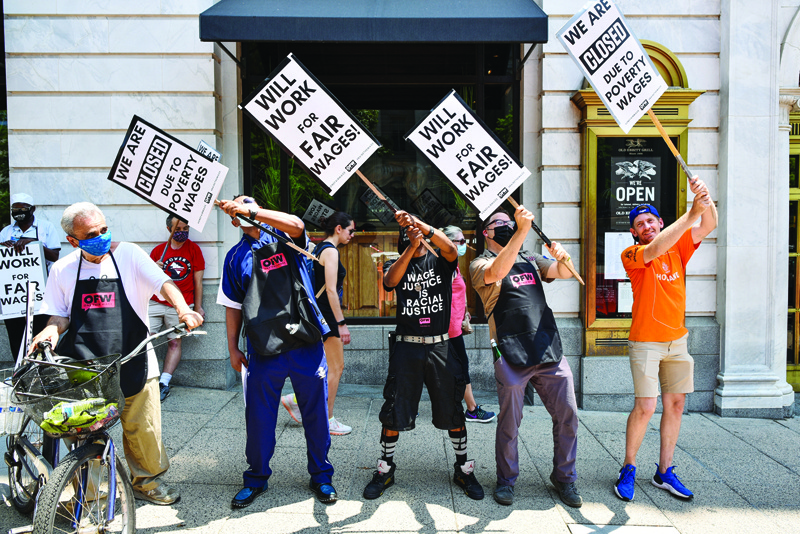 WASHINGTON: Activists take part in a protest outside of the Old Ebbitt Grill to call for a full minimum wage with tips for restaurant workers on May 26, 2021. - AFP
WASHINGTON: Activists take part in a protest outside of the Old Ebbitt Grill to call for a full minimum wage with tips for restaurant workers on May 26, 2021. - AFP
WASHINGTON: As the number of COVID-19 cases soared in Washington through the fall and winter, Tizoc Zarate waited tables at a local restaurant - but struggled to put enough food on the table for himself and his girlfriend. Zarate, 22, says he is angry about the health risks he faced, especially given the low pay - and the lack of support from his bosses. "I felt as if I couldn't say anything to management," Zarate told AFP, adding that at the time, he and his co-workers felt lucky to be working at all.
The Mexican-American server is not alone - hundreds of restaurant workers and activists protested this week at lunch-hour "wage strikes" across the United States, demanding an end to what they say is unacceptable pay for tipped workers. In the United States, restaurant and other service industry employees who earn more than a certain amount per month in tips can be paid far less than the standard minimum wage.
With the number of diners vastly reduced due to coronavirus-related restrictions in most US cities, those workers saw their take-home salary plummet. "During the pandemic, tips were down 60-70 percent and there were increased incidents of customer hostility and aggression," says Yamila Ruiz, the communications director for One Fair Wage, which organized the protests. "We've been holding strikes since last summer."
In Washington, the "wage strike" - staged by a handful of industry workers - took place Wednesday outside the Old Ebbitt Grill, a historic bar and restaurant not far from the White House that is popular both with politicians and tourists. "Low wages stop America's recovery," read one sign.
COVID-related stress on the job
Over the course of the pandemic, more than 2.5 million restaurant jobs were lost in the United States, according to the National Restaurant Association, and over 110,000 restaurants were closed. But now, some restaurants have said they are struggling to fill positions as businesses gradually reopen across the country, and activists say low wages are to blame.
"In January, eight percent of restaurant operators rated recruitment and retention of workforce as their top challenge," National Restaurant Association Senior Vice President Hudson Riehle said. "By April, that number had risen to 57 percent." The One Fair Wage organization surveyed restaurant workers and found that more than half reported they were considering leaving their job due to low wages.
The second most popular reason? COVID-related health risks. Zarate said during his drive home from his shift, he would agonize over whether he had been infected - or if somehow he had unwittingly infected someone else. "Probably half of the people were not wearing masks when I would come (to the table), some were not following the rule about the number of people at the table, and management would overlook things like that," he said. When Washington imposed tighter dining restrictions in December, the restaurant where he worked closed and Zarate was laid off.
'Wage shortage'
In a bid to attract employees, McDonald's US restaurants and Chipotle Mexican Grill this month announced plans to raise wages, though McDonald's wage increase will not pertain to franchises. "All restaurant sales are local," Riehle said. "So in the end, local market forces will impact not only the increase in needed workforce, but also the particular incentives needed to recruit those employees."
Republican critics including South Carolina congresswoman Nancy Mace blame a lack of workers in certain sectors on a supplemental US unemployment benefit of $300 a week enacted as part of President Joe Biden's $1.9 trillion relief package. Ruiz said this particular argument drove One Fair Wage to renew its protests.
"It's a wage shortage, not a worker shortage," Ruiz said, refuting the idea that restaurant workers are sitting idle during pandemic layoffs by noting that many found other work. After spending months trying - and failing - to figure out how to get unemployment benefits, Zarate finally found a new job at a pre-school. "I got an offer this week and accepted it on Tuesday," he said. - AFP




